Alex Scott: ‘No one knew that I was going to wear the armband in Qatar’
"Kelly, I’m going to wear this armband, don’t ask me any questions. The statement in itself is enough" recalls Alex - winner of the Sport Award at the Virgin Atlantic Attitude Awards, powered by Jaguar
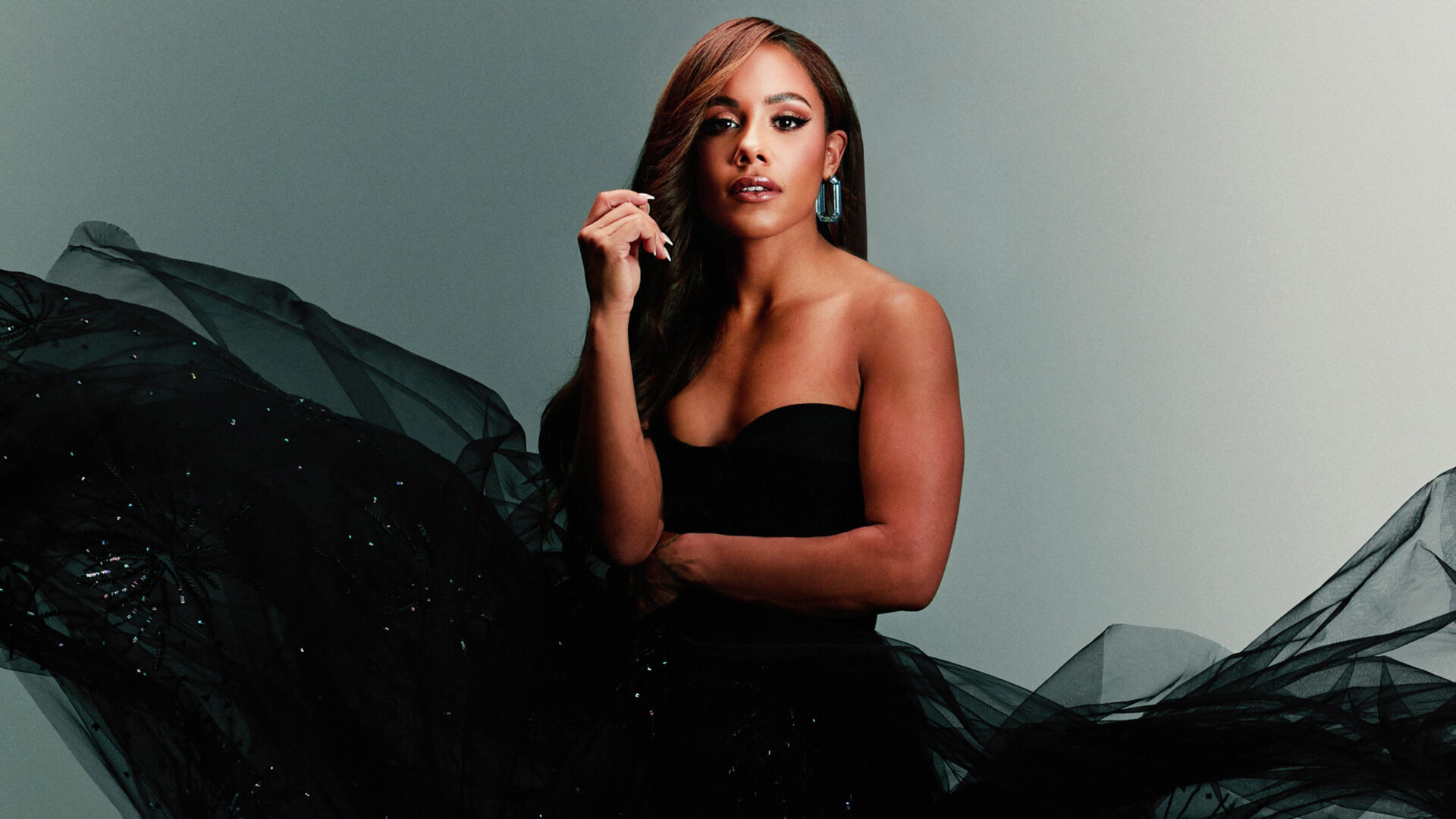
“I’m about to do something.” Alex Scott knew the gravity of what was about to happen when she sent this text to best pal Leah Williamson in the minutes leading up to England’s opening game in the 2022 Qatar World Cup, which Scott winner of the Sport Award at this year’s Virgin Atlantic Awards, powered by Jaguar was presenting for the BBC.
In a build-up interview that took place minutes after sending the text, the former England and Arsenal captain — who has not labelled her sexuality but shared that she’s been in relationships with men and women — donned a OneLove armband in a visual protest against homosexuality being illegal and punishable with prison sentences and death in the host nation.
Despite promises by the captains of nine European countries to wear the armband, all the nations had later made a joint U-turn after FIFA threatened to book players who stepped onto the pitch with the armband with a yellow card.
Scott recalls the frantic moment she decided to make her stand. “I remember before going live on TV, I’d done my glam, I was all ready. We were supposed to be celebrating and getting ready for an England game, to cheer them on. But there I was, feeling heavy and emotional and sad,” she recalls when we meet for her Attitude Awards cover interview. “I remember being pitchside and saw Andy [part of the England team’s PR crew]. I said to him, ‘Wait!’ I don’t even know where it comes from, but I was just like, ‘No one’s told me I can’t wear an armband. I’m an ex-England player, but it’s not me going out on that pitch.’ He’s like, ‘Genius.’” So began a “mad dash” to grab an armband from the changing room.
Scott confesses that the BBC “didn’t know” what she planned. In fact, she adds, “no one knew that I was going to do it.” She only gave interviewer Kelly Soames the heads-up seconds before being probed by her on live TV. The star knew the gesture didn’t come without risk. “I was actually fearful, because of everything I’ve heard about what goes on in Qatar,” Scott says of the sudden decision. “I was hiding [the armband] at that moment and put it on at the last minute as I was about to go live, and I said, ‘Kelly, I’m going to wear this armband, don’t ask me any questions. The statement in itself is enough.’”
“I was actually fearful, because of everything I’ve heard about what goes on in Qatar” – Alex Scott
Of course, she was right. Her clear show of support to the LGBTQ+ community and other discriminated groups had an immediate impact. “I could hear all the producers, then Gary [Lineker] and everyone in the studio shouting, ‘She’s got the armband!’ I just tried to block out everything. I can’t remember the question Kelly was asking me, I was just standing in front of the world with the armband and what a statement it was going to make at that moment. After getting the interview out the way, the first thing I thought was, ‘Am I actually going to be OK?’”
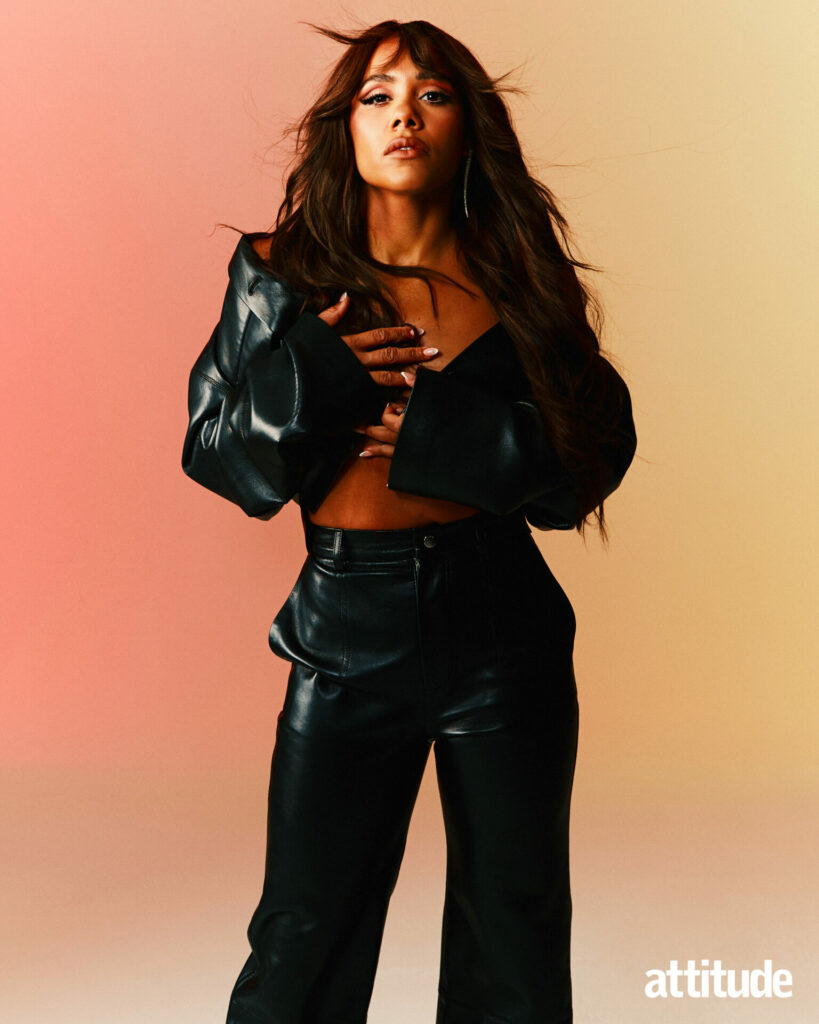
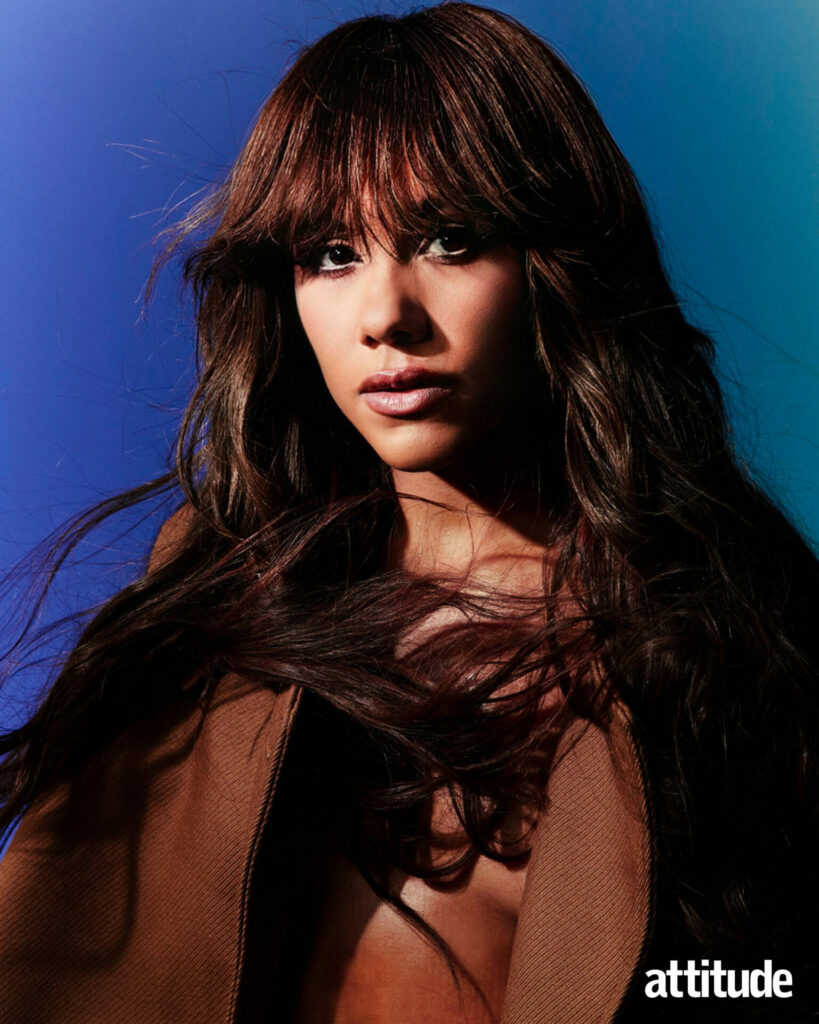
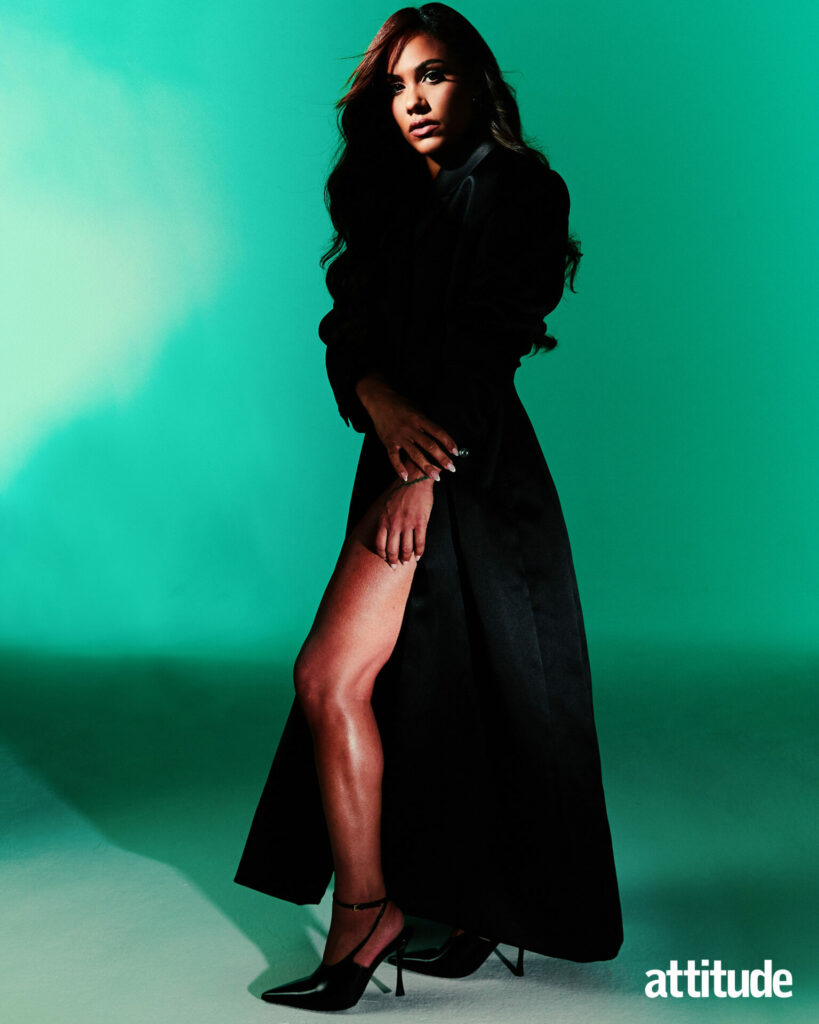
Her fears weren’t unsubstantiated either. Back in 2018, Scott was the victim of an attempted kidnap after meeting a friend for a drink during the World Cup in Russia, something she wrote about in detail in her debut book, How (Not) To Be Strong. She bizarrely managed to escape by showing her Uber driver media images from an engagement with FIFA alongside President Putin earlier that day. She knows she was “lucky” to get out. “I don’t even know how you think of it in those moments,” says Scott. “I was like, ‘You can’t kidnap me, because I’ve got a meeting with Putin in the morning!’ He literally turned the car around.”
Soon after her Qatar armband statement, the messages flooded in as she made headlines across the world. “It wasn’t for the recognition, it was just something I felt, ‘You’ve got to do it,’” Scott explains. As well as positive feedback, she also suffered a barrage of negativity online. At that point, the broadcaster still had three and a half weeks of analysis to rally through. “When I was wrapped up in that bubble of all that talk, especially because what I’d just done had created a massive divide, and I had a load of hate and abuse from it, that’s mainly what you’re seeing. It was hard for me out there,” she admits.
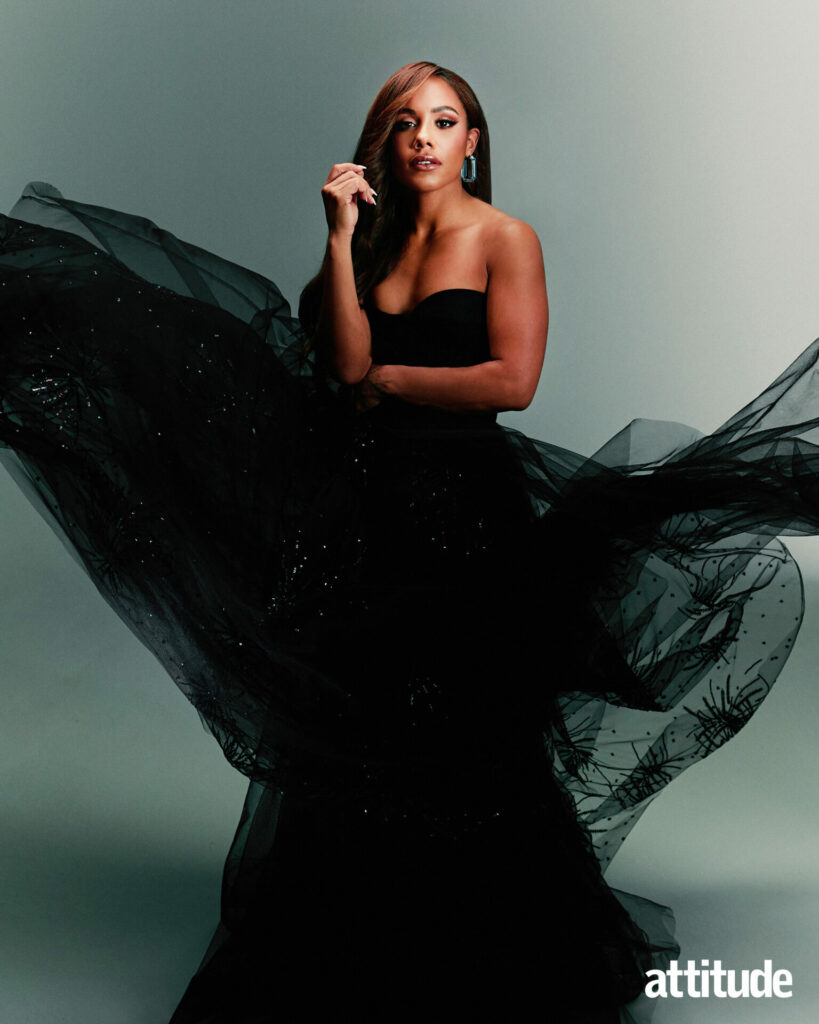
As a result, while in Qatar, she tried to keep a low profile. “I was hiding away in Qatar,” she remembers. But even there she could see that her action had made an impact, as she recalls one particularly poignant interaction with a native hotel worker. “I remember going to the gym one morning in Qatar. I was walking along, with my head down, trying to not even make eye contact with anyone. Then I heard, ‘Miss Scott!’ I looked up and it was a cleaner. They said, ‘Thank you for what you did,’ and in that moment, I got emotional, because once again, you have Qataris living there, knowing what a powerful statement it was.”
It wasn’t until Scott returned to the UK that she realised quite how important the moment had been, and how much it meant to millions of queer people around the world. Many commended her act of bravery.
“It wasn’t for the recognition, it was just something I felt, ‘You’ve got to do it'”
It had still come with what she describes as an “ongoing cost”, however. Appearing at a GQ Heroes event earlier this summer, during its ‘The Fight for Football’s Soul’ segment, Scott detailed making the decision to “disappear” for a while after the sporting event came to a close. This move was largely down to being on the receiving end of relentless online hate. “I was in a bubble of abuse being thrown at me every single day on social media,” she says.

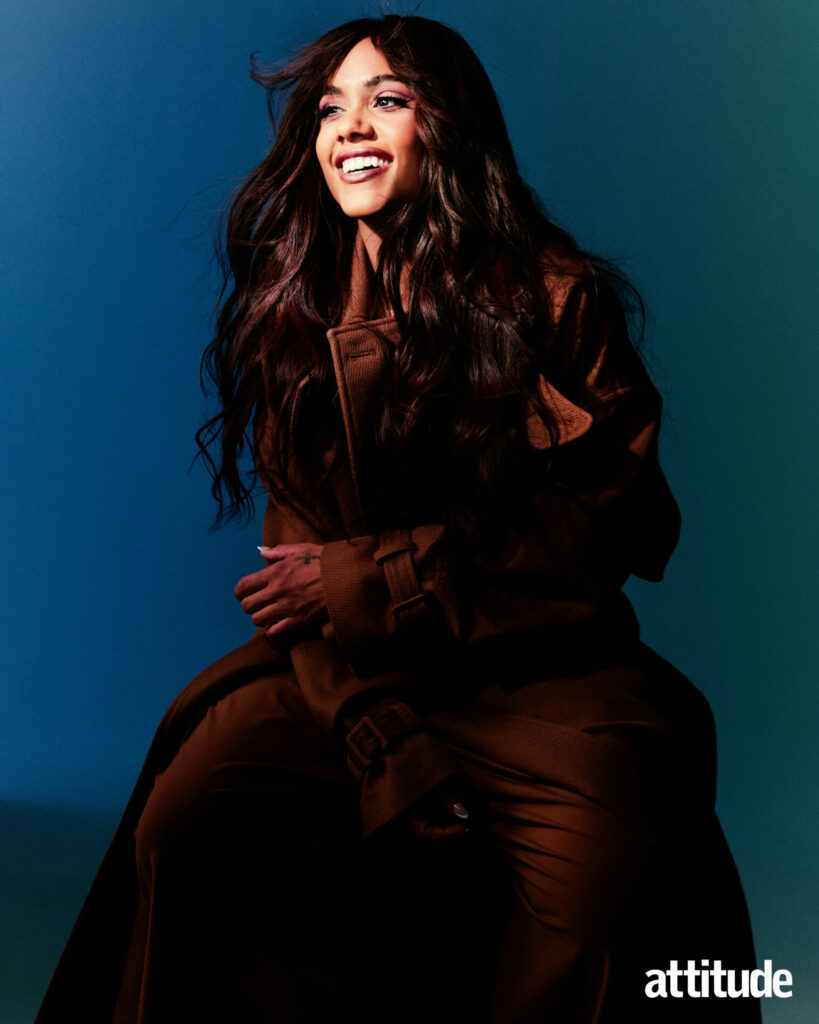
“I was seeing that amount of abuse constantly. It was hard to feel, constantly, that I upset people, in a way. Disrespecting anyone’s religion was never the intent behind any of it. Here we are talking about love and inclusion. Once again, it’s created such a divide. Trying to get my head around all of that, and how heavy it was… I’ve become the centre of it all. For me, I came back needing to escape life at that moment. I said to myself, ‘I need to go somewhere, to the sunshine, and just be away on an island and actually get back to thinking about love, loving life and being a bit free instead of [it being] all-consuming.’”
The reaction to her World Cup statement wasn’t new. Scott has faced online hate in droves at different points in her career. From her time presenting Football Focus, to when the BBC was accused of ‘box-ticking’ after she was wrongly rumoured to be replacing Sue Barker on long-running quiz show A Question of Sport in 2020. She labels the situation after Qatar “extreme” but is also acutely aware of the positive impact her protest had. “Every time you’re having a conversation and someone says, ‘We saw what you did,’ it’s clear the amount of respect that people have for you. I have to remember that side of it now,” she says.
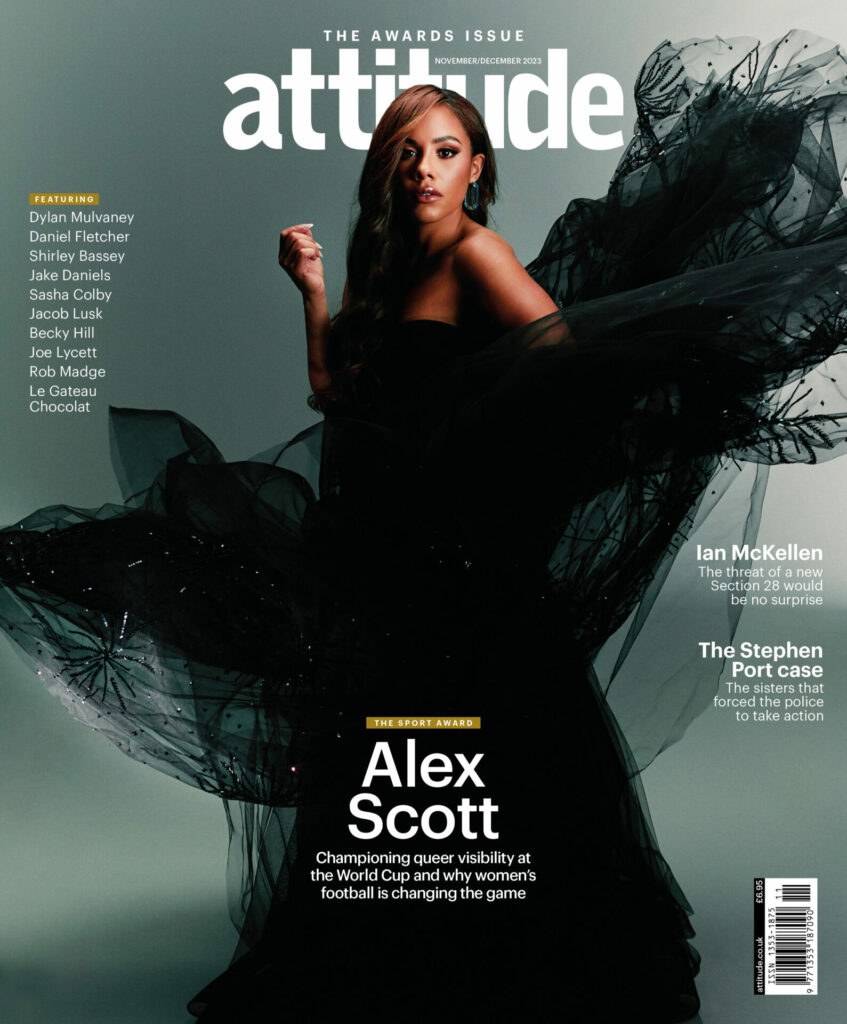
“When people have got good things to shout about, they don’t necessarily go on social media to give someone a pat on the back. That’s where you can think [the negativity] outweighs [the positivity]. Actually, it doesn’t, and it means more to me — people coming up to me and saying [that] to my face, than getting the abuse I [receive] online.”
When the question of allyship from within the game comes up, Scott immediately points to another Arsenal legend — Ian Wright. “He’s so supportive of everyone, just everyone being themselves, loving themselves, and is such a big supporter of the women’s game,” she says, adding how BBC Sport co-star Micah Richards was heavily supportive in Qatar too.
“When people have got good things to shout about, they don’t necessarily go on social media to give someone a pat on the back”
And yet, LGBTQ+ allies in the men’s game remain few and far between. When former Liverpool FC captain Jordan Henderson — who previously showed his support for the community through the likes of Stonewall’s ‘Rainbow Laces’ campaign — moved to Saudi club Al-Ettifaq FC this summer, he was met with heavy backlash from LGBTQ+ fans and allies. David Beckham was also involved in a media storm for his Qatar deal, reportedly worth £10 million, that resulted in him being the face of the country’s tourism promotion during the World Cup. Comedian Joe Lycett shredded Beckham’s 2002 Attitude cover after he failed to end the partnership.
“It’s staying true to your word,” Scott notes of those who choose to go against previous commitments to the LGBTQ+ community. “It’s remembering, why did you use your voice before? Why are you doing what you are doing? I don’t make judgments on people, but I say the only thing that I do feel, for example, about Jordan Henderson, you’ve used your platform and you’ve been outspoken, but now you’re playing over [in Saudi Arabia]? Is he thinking he can be over there and actually have conversations or do something? I don’t know.
“That’s the hard thing about it for someone like David Beckham, who has been that kind of [gay] icon. It’s hard to know their reasons or their motives. All I can talk about is, what would I do in that situation? What am I doing as a human being?” says Scott. “I will continue to be outspoken and supportive and the biggest ally that I can be.”
Women’s football luckily offers a much more diverse space. The Women’s World Cup this summer saw Canadian footballer Quinn become the first and only known trans and non-binary athlete to compete at a FIFA World Cup.
“I was being asked questions, ‘You need to label what you are; you need to come out.’ But I was like, ‘No, actually, I don’t need to”
Scott offers her take on why there’s much more inclusivity within the women’s game: “It has always been about a community. We’ve been fighting for every single thing from day one. It’s always felt like a place that you can come and celebrate — everyone’s welcome. As players, you never felt you couldn’t be yourself, or that judgements would be on you. I feel we’ve been blessed in that sense that we’ve had that freedom.”
Scott has never publicly confirmed her sexuality but opened up about her previous eight-year relationship with ex-girlfriend Kelly Smith in her 2022 book. I ask what the response was like to the chapter on her love life. She admits there were a lot of “shocked” reactions from readers as well as people Scott knows personally. “That’s the thing — I have a really [close-knit] family and friends who all knew about [my relationship], but obviously no one really knew,” she says. “Everyone that read it has come up to me and said, ‘What a beautiful chapter.’”
Scott was asked to identify her sexuality after sending the chapter off for edits but remained firm on not doing so. “I was being asked questions, ‘You need to label what you are; you need to come out.’ But I was like, ‘No, actually, I don’t need to — I’m writing a story about love.’ I hope that we get to a stage where everyone can just choose to love who they want to love and not feel that they have to then explain that to anyone.”
“That show was just a big bubble of happiness” – Alex Scott on Strictly
Scott won a whole new legion of fans with her turn on Strictly Come Dancing in 2019. She was paired with dancer Neil Jones, becoming one of the favourites to win. They pair made it all the way to the quarter-finals. When I probe her on her stint, she pauses, realising she hasn’t mentioned Michelle. That is, Strictly co-star and Drag Race royalty, Michelle Visage, who she’s set to meet later on for a dance and a catch-up. She describes the American as someone who’s had a “major impact” on her life. “[We come] from two opposite ends of the world: her, this New Yorker, to me growing up in the East End. We had an instant connection, and she took me under her wing.”
Scott reminisces about Strictly with nothing but joy. “That show was just a big bubble of happiness. I’d always wanted to do it, but I never thought that they would see me as a celebrity to even be on the show! When they told me that I was doing it, I was just beside myself!” She describes the process as a “dream” and is all smiles reflecting on the experience. “Before [Strictly], I was just Alex Scott, the sportsperson. Actually, [viewers] saw me, which I absolutely loved, and I connected with people in such a different way. The amount of different people coming up to me… the grandmas in the supermarket, the little kids that saw me dance as Moana or as one of the Ghostbusters. I loved it.”
“I owe everything to [my mum] really, to thank her for allowing me to be me”
It’s been a wild few years for Scott, who says there is one person whose support has meant everything and that she wants to dedicate her Attitude Award to: “My mum. Here’s a woman that has gone through a lot in her life. She brought me up in such a way that it’s full of kindness, full of love and empathy towards people, that has allowed me to open my eyes and see the world in such a different way.”
It was her mum, Carol, who encouraged her to pursue her dreams of becoming a professional footballer. Scott wonders if a moment like Qatar would have even happened, had it not been for her unwavering support. “Would I have been brave enough to continue to use my platform in such a way when there’s so many wrongs in the world? I don’t think so. I owe everything to her really, to thank her for allowing me to be me,” says Scott. “The first time I ever told her I was in a relationship with my teammate, it wasn’t even a thing. To feel such freedom in everything that I do, and know that she has nothing but love and respect for me, that’s how I live my life.”
Words Charlotte Manning Photography Azazel Photography Assistant Simeon Asenov and Jos Hammaren Creative direction & styling Joseph Kocharian Hair Jay Birmingham Make-up Grace Macartney Fashion Assistant Aaron Pandher
Issue 355, the November/December issue of Attitude, is available to pre-order now.
